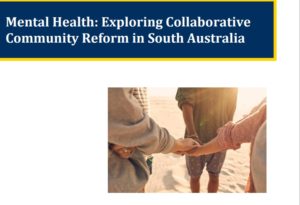 A new report launched in Adelaide this week provides a new foundation and direction for the reform of mental health care in South Australia.
A new report launched in Adelaide this week provides a new foundation and direction for the reform of mental health care in South Australia.
The report, Mental Health: Exploring Collaborative Community Reform in South Australia, identifies and explores the community mental health sector priorities for reform, identifies current barriers to the provision of cross-sectoral service integration and investigates the importance of sustainable accommodation and appropriate support in helping people live with mental illness.
The study was undertaken by the Australian Centre for Community Services Research at Flinders University in partnership with the Don Dunstan Foundation and the Mental Health Coalition of South Australia.
Researchers Tanya MacKay and Dr Ian Goodwin-Smith conducted one-to-one interviews with key stakeholders in the Government and community sector, and key stakeholders in community mental health reform and policy.
Community members who live with or care for someone living with mental illness also participated in focus groups to inform its key priorities from a lived experienced perspective.
“We’re really pleased to be a part of this research with its collaborative approach,” said Geoff Harris, Executive Director for MHCSA. “It sought out the views of people and families affected by mental illness as well as clinicians and service providers.
“I trust that the research and recommendations will be helpful in identifying key priorities for the development of South Australia’s mental health plan.”
Donna Harden, Executive Director of the Don Dunstan Foundation, said: “The study identifies what has worked through the ‘Stepping Up’ initiative and subsequent policies and plans; what we need to change; and what we need to start doing to support consumers on a true recovery journey to a contributing life.
“The integration of mental health support across non-mental health community services is recognised as a vital link in improving the outcomes for those experiencing mental illness.
“This has important implications for our approach to the delivery of a range of social services – such as homelessness services.”
With one in five Australians experiencing mental illness and a mental health ‘system’ described by the National Mental Health Commission (NHMC) in 2014 as “often ad hoc” and “with no clarity of roles and responsibilities or strategic approach reflected in practice” the South Australian project will play a key role in bringing much needed change.
This research highlights the importance of continuing to improve our mental health system in SA through investment in innovative community models in SA.
Concerns have been raised by stakeholders in the report about recent declines in funding for some highly effective community models.

